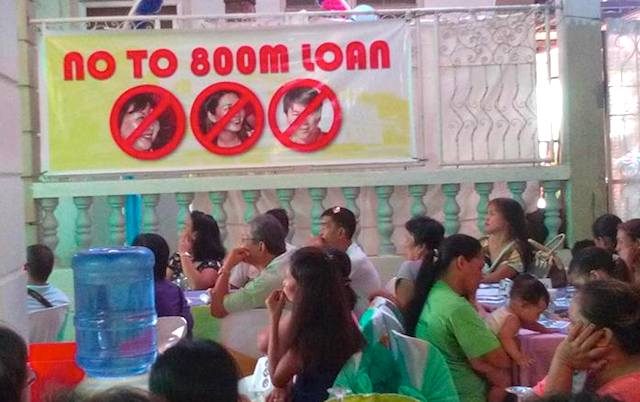SUMMARY
This is AI generated summarization, which may have errors. For context, always refer to the full article.

SAMAR, Philippines – Church and civil society groups in Samar have launched a province-wide signature campaign to protest the plan of the provincial government to obtain an P800-million loan from the Land Bank of the Philippines.
The No to P800 Million Loan Coalition, which aims to gather 600,000 signatures in Samar, was prompted by the bid of the provincial government to secure a loan from Landbank, for the construction of roads and a provincial hospital.
Lawyer Alma Uy-Lampasa told Rappler that in a special session on July 1, the Sangguniang Panlalawigan (provincial board) approved a resolution authorizing Governor Sharee Ann Tan to negotiate a loan with the Development Bank of the Philippines (DBP) or Land Bank of the Philippines (LBP).
Lampasa was the lone provincial board member who opposed the passage of the so-called “borrowing ordinance.”
The amount – P851,104,860.90 – is to finance the construction and improvement of roads in remote villages of the province, and the construction of the provincial hospital.
Lampasa said that a day later, July 2, the provincial board came up with a Joint Committee Report recommending a “borrowing ordinance” that gives the governor blanket authority to enter into a loan contract with the Development Bank of the Philippines (DBP) for the said amount.
She said it was made to appear then that the DBP provided better terms.
But months later, in a regular session on October 29, the provincial board approved another borrowing ordinance, citing the same purpose approved by the board in July – road improvement and construction, and the construction of the provincial hospital.
DBP vs Landbank
The only difference between the July and October ordinances, Lampasa said, was that the latest one now gives Tan the authority to enter into a loan contract with Landbank and not with the DBP, and in the amount of P800 million with an annual interest of 5% per annum, using 20% of the provincial internal revenue allotment (IRA) as collateral.
“We are now groping in the dark as to the real reasons why the DBP loan did not push through and the provincial governor is now negotiating with LBP, securing a loan of P800 million,” she said.
Lampasa said Tan did not make a formal report to the provincial board on why the Landbank loan is more advantageous to the provincial government and Samar.
“The people of Samar are being deprived of the opportunity to deal and to negotiate loans, with other banking institutions that offer better loan terms,” she said.
Lampasa has written the president and chief executive officer of Landbank, as well as Finance Secretary Cesar Purisima, seeking to block the proposed loan to the Samar government.
In her letter to Landbank, she asked for details of the loan process, including the date when the negotiations began, the persons who represented the bank and the province in the negotiations, and the terms and conditions arrived, among others.
Letter to DOF
In her letter to Purisima, Lampasa appealed for the disapproval of the proposed loan and to deny the issuance of a certification of borrowing capacity of the provincial government of Samar.
She cited the following reasons:
- Samar province has been a recipient of adverse Commission on Audit findings in previous years
- The projects for the loan are not included in the approved Annual Investment Plan for the current year
- The provincial government has not shown compliance with the Full Disclosure Policy of the Department of the Interior and Local Government, as embodied in DILG Memorandum Circular No 2010-83.
- The loan is “unconscionable” and way beyond the capacity of the province to pay because, among others, the provincial government is faced with massive corruption issues and is heavily dependent on the Internal Revenue Allotment as gleaned from the COA Annual Reports
Lampasa stressed that deducting yearly amortizations from the IRA of the province will have have an adverse effect on the delivery of basic services to the people of Samar.
Stop the loan
“We are calling on the government to stop the loan and to conduct investigation regarding the claims and loans of the province,” said Raul Baldeviz, spokesperson of the No to P800 Million Loan Coalition.”
“We want to gain economic justice for the poor people in Samar as they should have what they need to live. We don’t want the money to be used for the nearing elections,” Baldeviz said in a mix of English and Filipino.
Francis Joseph Grey, provincial president of the Youth Sector of Bag-o nga Samar Movement, said that gains in civil rights have not improved lives in Samar.
“Political corruption in Samar [remains] continuously unchecked and because of this, our trust in politicians is damaged,” Grey said.
“We and the rest of the people of Samar are here, poor, and our local officials made us this way…and we’ve come to stay until they do something about it.’ Grey said.
Reshil Yrigon of the People Surge Western Samar lamented: “We are in the midst of a crisis where the people no longer trust their government. People are suffering, and the government doesn’t seem to serve and care for the people.”
Yrigon noted that the provincial government has chosen to prioritize securing loans for the construction of farm-to-market roads, when victims of typhoons Seniang and Ruby, and Super Typhoon Yolanda continue to need help. – Rappler.com
Add a comment
How does this make you feel?
There are no comments yet. Add your comment to start the conversation.